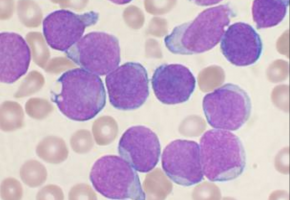
In data presented at ASH 2018 in San Diego, investigators from Australia have identified a genetic mutation that causes resistance to the targeted drug venetoclax in patients with chronic lymphocytic leukaemia (CLL).
Venetoclax promotes cancer cell death by blocking a protein known as B-cell leukaemia/lymphoma 2 protein, or BCL2, that helps cancer cells to survive.
Levels of BCL2 are abnormally high in many patients with CLL.
The newly discovered mutation in BCL2 significantly reduces the ability of venetoclax to latch on to and block the protein, said lead author Piers Blombery, MD, of the Peter MacCallum Cancer Centre and Royal Melbourne Hospital in Melbourne, Australia.
“Although venetoclax is a highly effective drug for CLL, most patients eventually relapse,” Dr. Blombery said.
“The mutation we have found helps to explain why venetoclax stops working in some patients. Furthermore, we have shown that in some cases the mutation can be detected in patients’ bone marrow years before clinical signs of relapse appear.”
Dr. Blombery and his colleagues performed genomic sequencing on tumour samples from 67 patients whose CLL had come back after treatment with venetoclax.
For 15 of these patients, the investigators were able to evaluate tumour samples from both before and after venetoclax treatment.
The mutation was identified in after-treatment tumour samples from seven of these 15 patients.
“We also tested almost 400 patients with CLL and other blood cancers who had never been treated with venetoclax, and we did not find this mutation in any of those patients,” said Dr. Blombery.
“This is evidence that the mutation only develops during venetoclax treatment, so it is something that patients can be screened for. In patients who develop this mutation at a low level, it would be prudent for the hematologist to begin to look for other therapies to use instead.”
Venetoclax was the first drug targeting BCL2 to be approved by the U.S. Food and Drug Administration (FDA).
Initially it was approved only for the treatment of patients with CLL whose tumours had a genetic alteration in which a piece of one chromosome was missing.
In June 2018, FDA expanded the drug’s approval to include all patients with CLL whose disease progressed after at least one previous treatment, regardless of whether their cancer cells have this genetic alteration.
While identification of the BCL2 mutation helps to explain why CLL recurs in some patients treated with venetoclax, much still remains to be understood about the factors underlying CLL recurrence after venetoclax treatment.
“We don’t know what caused the cancer to relapse in the eight patients in whom we did not find the BCL2 mutation,” Dr. Blombery said. “Moreover, in the seven patients who had the mutation, we found it in only some of their cancer cells––and yet the cells that did not carry the mutation were still contributing to the cancer’s growth. So, clearly, even among patients who have the mutation, other factors are at play in causing resistance to venetoclax therapy.”
In one patient, the investigators found a second genetic abnormality generating resistance to venetoclax treatment in cells that did not carry the BCL2 mutation.
“This demonstrates the importance of considering multiple angles of attack with combination therapies––for example, venetoclax and rituximab––rather than relying on a single targeted agent in a disease that has multiple genomic tricks up its sleeve,” Dr. Blombery said.
The investigators are planning to conduct more extensive genomic analysis of the patients who did not develop the BCL2 mutation to identify other mechanisms of resistance to venetoclax.
They also plan to gather more data on the time course of acquisition of the BCL2 mutation.
Source: ASH
We are an independent charity and are not backed by a large company or society. We raise every penny ourselves to improve the standards of cancer care through education. You can help us continue our work to address inequalities in cancer care by making a donation.
Any donation, however small, contributes directly towards the costs of creating and sharing free oncology education.
Together we can get better outcomes for patients by tackling global inequalities in access to the results of cancer research.
Thank you for your support.